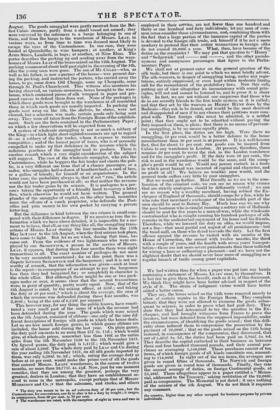We had written thus far when a paper was put
into our hands containing a statement of Messrs. LEAFS' case, by themselves. It is but fair to give them the benefit, such as it is, of this document. We think they might have been better advised in respect of the style of it. The strain of indignant virtue would have better suited a better cause.
They say, the boxes seized on the 12th were removed merely to allow of certain repairs in the Foreign Room. They complain bitterly that they were not allowed to examine the goods subse- quent to seizure, in order to prove what had paid duty. They state that they had determined to try the question in the Ex- chequer, and had brought witnesses from France to prove the invoices, but were deterred from the supposed impossibility, under the circumstances, of identifying the goods seized ; that this diffi- culty alone induced them to compromise the prosecution by the payment of 20,0001.; that on the goods seized on the 12th being restored, in consequence of the compromise, they discovered, that out of 5,469/. 9s. 3d., the duties had been paid on 3,986/. Sr. 8cl. They describe the capital embarked in their business as betweeuv three and four hundred thousand pounds, and their annual pur- chases as averaging 1,540,000/. These purchases consist of ten items, of which foreign goods of all kinds constitute one, amount- ing to 110,000/. In eight out of the ten items, the averages are given in round fifties of thousands. The Norwich and foreign goods are given in round tens of thousands. Finally, they rate the annual average of duties, on foreign Continental goods, at' 23,400!. These allegations appear in a paper entitled a "Memo- rial, addressed to the Treasury," asking restitution of the 20,000/, paid as compromise. • The Memorial is not dated ; it says nothing of the seizure of the 5th August. We do not think it requires. any comment.
the country, higher than any other occupied for business purposes by private individuals.


























 Previous page
Previous page